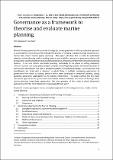Files in this item
Governance as a framework to theorise and evaluate marine planning
Item metadata
| dc.contributor.author | Stojanovic, Tim | |
| dc.contributor.author | Gee, Kira | |
| dc.date.accessioned | 2022-02-08T00:42:13Z | |
| dc.date.available | 2022-02-08T00:42:13Z | |
| dc.date.issued | 2020-10 | |
| dc.identifier | 268710816 | |
| dc.identifier | ed10f5d4-583a-4402-8769-67e05052e51b | |
| dc.identifier | 85089535056 | |
| dc.identifier | 000567444700004 | |
| dc.identifier.citation | Stojanovic , T & Gee , K 2020 , ' Governance as a framework to theorise and evaluate marine planning ' , Marine Policy , vol. 120 , 104115 . https://doi.org/10.1016/j.marpol.2020.104115 | en |
| dc.identifier.issn | 0308-597X | |
| dc.identifier.other | ORCID: /0000-0002-8936-2299/work/78891565 | |
| dc.identifier.uri | https://hdl.handle.net/10023/24817 | |
| dc.description.abstract | Marine Planning seems to offer promise to integrate oceans governance with a prospective approach to sustainability, most distinctively through the process of creating a spatial strategy contained in a marine plan, hence ‘marine spatial planning’. This paper will show that in order to understand whether marine planning really is leading towards sustainability, recourse to governance theory will be required. Governance theory can provide principles or a theoretical framework for marine planning systems. It can also inform practicable planning, particularly in the phase of setting evaluatory criteria- a phase that many policy analysts consider should logically proceed the implementation of marine plans themselves- but also in broader questions of institutional design. Yet researchers and practitioners are faced with a situation in which there a multiple, competing approaches to governance from which to choose, some of which were developed in terrestrial contexts, raising questions about their applicability to the marine environment. This paper outlines five key major theoretical approaches for governance and reviews analytical debates and empirical findings about marine planning using those approaches. The core question of this study is which theoretical approaches offer the most traction for evaluating MSP and why? | |
| dc.format.extent | 697981 | |
| dc.language.iso | eng | |
| dc.relation.ispartof | Marine Policy | en |
| dc.subject | Oceans | en |
| dc.subject | Good governance | en |
| dc.subject | Ecosystem approach | en |
| dc.subject | Multi-level governance | en |
| dc.subject | Modes | en |
| dc.subject | Marine spatial planning | en |
| dc.subject | G Geography (General) | en |
| dc.subject | T-NDAS | en |
| dc.subject | SDG 14 - Life Below Water | en |
| dc.subject | SDG 16 - Peace, Justice and Strong Institutions | en |
| dc.subject.lcc | G1 | en |
| dc.title | Governance as a framework to theorise and evaluate marine planning | en |
| dc.type | Journal article | en |
| dc.contributor.institution | University of St Andrews. School of Geography & Sustainable Development | en |
| dc.contributor.institution | University of St Andrews. Scottish Oceans Institute | en |
| dc.contributor.institution | University of St Andrews. St Andrews Sustainability Institute | en |
| dc.contributor.institution | University of St Andrews. Coastal Resources Management Group | en |
| dc.contributor.institution | University of St Andrews. Marine Alliance for Science & Technology Scotland | en |
| dc.identifier.doi | 10.1016/j.marpol.2020.104115 | |
| dc.description.status | Peer reviewed | en |
| dc.date.embargoedUntil | 2022-02-08 |
This item appears in the following Collection(s)
Items in the St Andrews Research Repository are protected by copyright, with all rights reserved, unless otherwise indicated.

